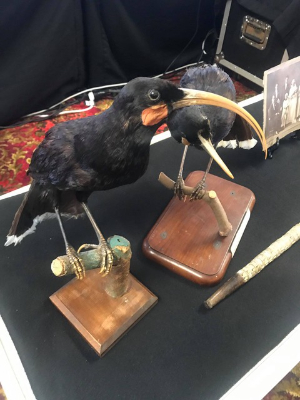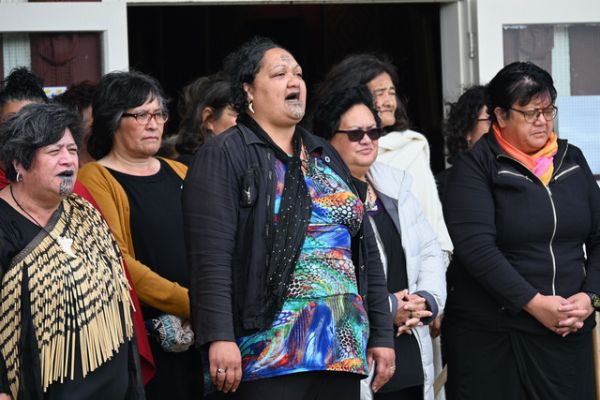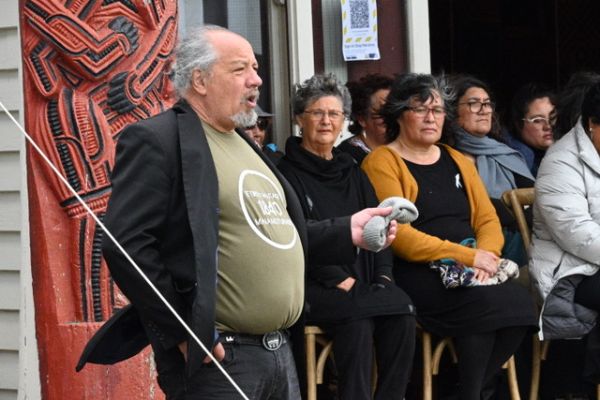Symbols Of Loss And Also Of Unity

Two extinct huia birds are potent symbols of the impact of colonisation on Ngā Hapū o Te Reureu. The huia are traditionally a symbol of rangatira and also about uniting people. The huia, have been loaned out courtesy of the Whanganui Regional Museum. They comprise a number of taonga taking pride of place at a sitting of the Waitangi Tribunal being held at Te Tikanga Marae, Tokorangi, near Feilding.
The Ngāti Raukawa iwi confederation are currently presenting their claims to the tribunal. Ngā Hapū o Te Reureu representative Paruhe Smith said “the two extinct huia in our house symbolise the loss of our land, our reo, our culture and the detrimental impact of colonisation.”

Mr Smith supported the main issue raised at previous hearings regarding the fraudulent purchase of the Rangitikei/Manawatū Block by the Crown.
Mr Smith said when the treaty was signed in 1840 Raukawa had in its domain approximately 780,000 acres, from Whangaehu to the Ruahine Ranges, but this has been dramatically reduced. The first block of 230,000 acres was gifted back to Ngāti Apa by the rangatira Nepia Taratoa. Another gift was the Ahuaturanga Block, of 220,000 acres which was gifted to Rangitāne.
“The remaining Rangitikei-Manawatū block was fraudulently purchased by the Crown. Through this action it left our iwi virtually landless.”
However, the Government’s land purchase negotiator Sir Donald McLean, went about setting up a reservation for those Māori owners who were against the sale of lands. This comprised mainly Ngā Hapū o Te Reureu. Mr Smith said this was originally 20,000 acres but was eventually reduced to 4,400 acres.
“This reservation was set up for four tribes which was totally inadequate to sustain our people. The land was largely a flood plain with erosion problems being an issue that still occurs today. The quality of the water has been affected by deforestation, water pollution further upstream and diversion of waterways. Gravel extraction and council representation are some of the challenges our iwi are now confronted with.”
Ngāti Raukawa iwi confederation are presenting their treaty claims to the Waitangi Tribunal. This time at Te Tikanga Marae, Tokorangi for what is the fourth week of hearings. Ngā Hapū o Te Reureu are an amalgamation of hapū comprising various iwi who originally migrated during the early 1800s as part of the iwi led by Te Rauparaha and Te Rangihaeata. They comprise Ngāti Rangatahi, Ngāti Matakore, (both of Ngāti Maniapoto originally from the King Country) Ngāti Pikiahu Waewae, a united hapū of Ngāti Pikiahu from Ngāti Raukawa (Waikato) and Ngāti Waewae from Ngāti Tūwharetoa (Taupō/Tūrangi). They live in an area south of the Rangitikei River and north-east of Halcombe.

Ngā Hapū o Te Reureu were well known for their staunch opposition to land sales and participated in the land wars assisting their relations in Taranaki and the Waikato. All the marae in Te Reureu are affiliated to the Kīngitanga. Ngāti Rangatahi were also involved in the first confrontation of the land wars - the Wairau Affray near Blenheim. These hapū made their individual ways to settle Te Reureu.
Iwi historians and claimants will present evidence during the week including Hare Arapere and Puruhe Smith supported by members of the Arapere, Paranihi, Emery and Tibble whānau. On Thursday, Dr Rawiri Durie and Tā Taihākurei Durie will present the Ngāti Rangatahi position. The week will wind up on Friday at lunchtime.
The twelve designated hearing weeks started at Hato Paora College, Feilding on 9 March 2020 and will progress to Horowhenua and Ōtaki following a clear historical sequence of events. The original claim Wai 113 was lodged in 1989 by Whata Karaka Davis, Ngārongo Iwikātea Nicholson, Te Maharanui Jacob and Pita Richardson. They have now all passed on.


 Gordon Campbell: On The Left’s Electability Crisis, And The Abundance Ecotopia
Gordon Campbell: On The Left’s Electability Crisis, And The Abundance Ecotopia NZCAST: NZCAST Leads Ongoing Cross-Agency Collaboration To Break Down Barriers For Survivors Of State Abuse
NZCAST: NZCAST Leads Ongoing Cross-Agency Collaboration To Break Down Barriers For Survivors Of State Abuse Regional and Unitary Councils Aotearoa: Regional And Unitary Councils Back A Practical FWFP System
Regional and Unitary Councils Aotearoa: Regional And Unitary Councils Back A Practical FWFP System NZ Government: Stay Safe On Our Roads This Easter
NZ Government: Stay Safe On Our Roads This Easter YWCA: Global Push Back Against Gender Equality A Growing Crisis In Aotearoa
YWCA: Global Push Back Against Gender Equality A Growing Crisis In Aotearoa Te Pāti Māori: Ngarewa-Packer - Fast-Tracking Seabed Mining Ignores Māori Opposition And Environmental Precedent
Te Pāti Māori: Ngarewa-Packer - Fast-Tracking Seabed Mining Ignores Māori Opposition And Environmental Precedent New Zealand Defence Force: Defence And Customs Strengthen Maritime Security With Uncrewed Surface Vessels
New Zealand Defence Force: Defence And Customs Strengthen Maritime Security With Uncrewed Surface Vessels


